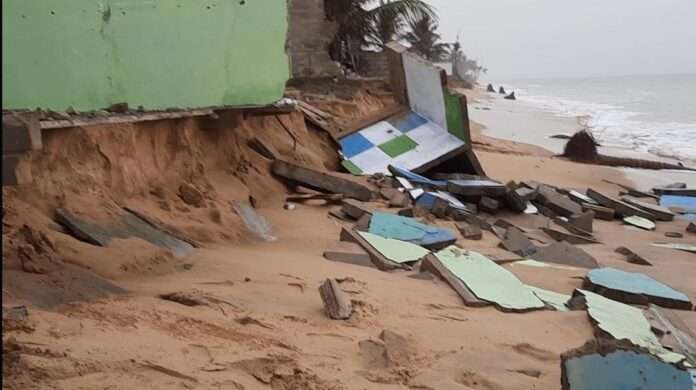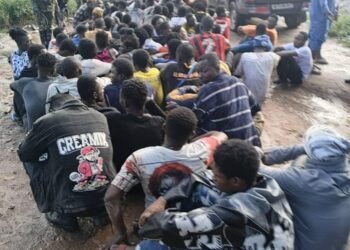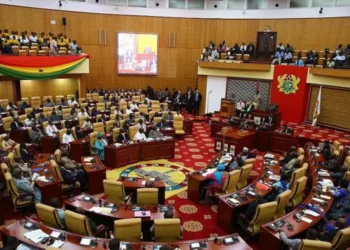Ghana’s worsening coastal erosion crisis has reached a breaking point, as tidal waves continue to devastate the Ketu South Municipality, displacing thousands and destroying infrastructure in the community of Amutsinu.
With growing calls from civic leaders and affected residents, pressure is mounting on the government to urgently implement long-promised solutions.
In the latest incident, ferocious tidal waves swallowed large parts of the Salakope-Amutsinu stretch, leaving behind a trail of wrecked homes, collapsed schools, and broken livelihoods.
The damage has forced scores of residents to flee to makeshift shelters in churches, classrooms, and roadside encampments. The trauma is visible not just in the rubble but in the uncertainty etched on the faces of the displaced.
Renowned lawyer and social activist Richard Dela Sky described the event as a dire signal of a rapidly intensifying threat.
“A huge portion of this community has been swallowed by the ocean, displacing thousands of residents and leaving families homeless, traumatized, and stripped of their livelihoods.”
Richard Dela Sky
Calling for immediate action, Sky noted that this latest wave of destruction is “not an isolated incident,” but part of a broader environmental catastrophe gripping Ghana’s coast.
According to him, “Ghana’s coastline is reportedly vanishing at an alarming rate of 2–5 meters per year, with communities like Fuveme and Dzakplagbe already lost to the waves.”

The sea’s steady advance is not just a climate issue—it is now a full-blown humanitarian emergency, with entire towns being erased from the map.
Despite years of warnings from scientists and community leaders, the pace of intervention has not kept up with the growing scale of the threat.
Sky has demanded that the government swing into immediate action on several fronts: deliver humanitarian aid, complete long-stalled coastal defense projects, and explore more sustainable and ecologically friendly approaches to shoreline protection.
Blekusu Project Delays Spark Outrage
At the heart of the criticism is the stalling of Phase II of the Blekusu Sea Defense Project, a major coastal protection initiative that has yet to be completed.
The West Africa Coastal Areas (WACA) Resilience Investment Project, another key program backed by development partners, has also lagged behind in delivering comprehensive relief to affected communities.
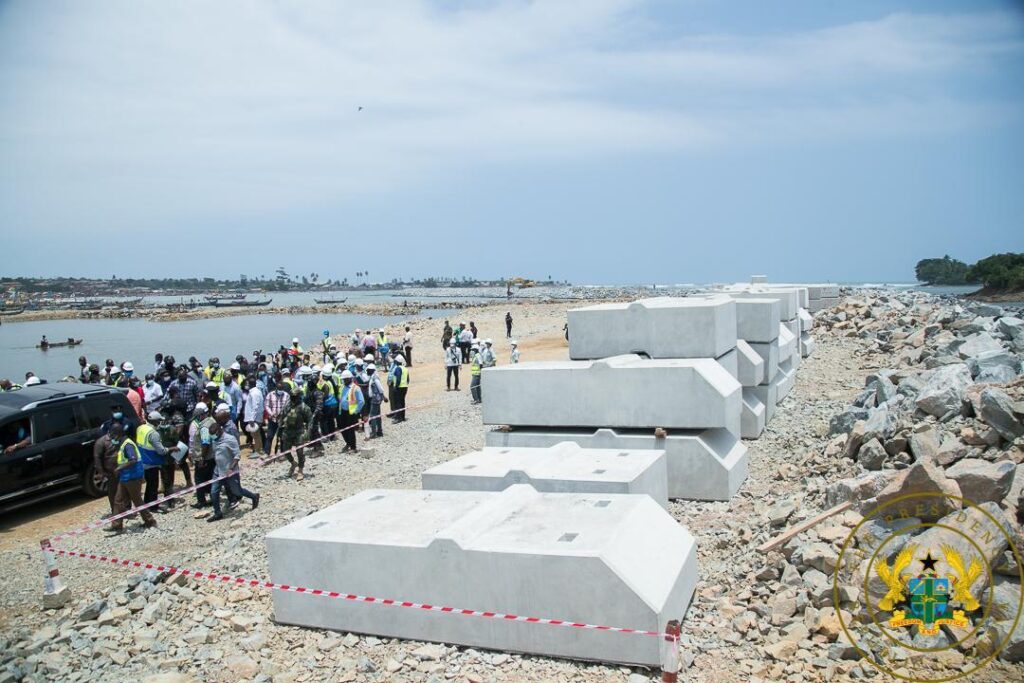
“Adopt holistic solutions beyond seawalls, such as mangrove restoration and ‘horizontal levees,’ which mitigate erosion while preserving ecosystems. Relocate at-risk communities with dignity and compensation, as advised by experts, to safer inland areas.”
Richard Dela Sky
He further cautioned that any delay in taking action would result in greater loss of life, erosion of cultural heritage, and deepening economic instability, emphasizing that while Ghana may hesitate, the advancing ocean will not.
The situation has now reached a tipping point in Amutsinu, with angry residents resorting to roadblocks along the Keta-Aflao highway in protest of the government’s inaction.
The blockade has disrupted transportation across key towns, including Aflao, Denu, and Adafianu, as residents demand urgent steps to begin sea defense construction.
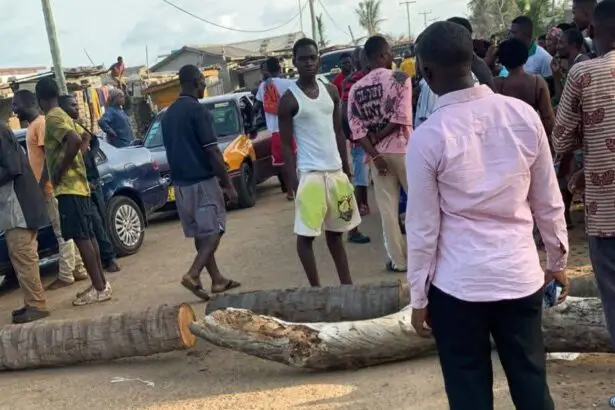
Richard Ahiagbah, the Director of Communications for the New Patriotic Party (NPP), also weighed in on the crisis, issuing a public appeal to the government.
“Mr. President, this is the state of the Agavedzi, Salakorpe, and Amutimu link road from Aflao, Denu, Adafianu, Keta, and Angloga today! These communities are quickly going off the grid while the government looks on…”
Richard Ahiagbah
Ahiagbah emphasized the need for swift and decisive intervention to protect lives and property. “The government must act fast to save the situation,” he declared.
Coastal Erosion Now A National Security Risk
The cumulative damage from coastal erosion is beginning to pose broader risks to Ghana’s national development goals.
Beyond the immediate humanitarian toll, schools, clinics, farmlands, and businesses continue to disappear under the tide—weakening local economies and stretching public resources thin.
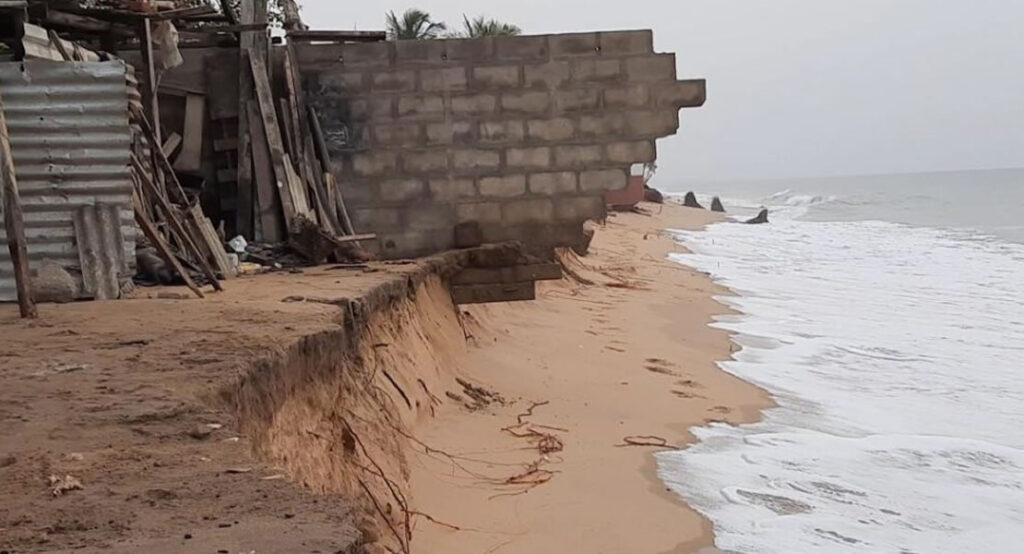
Environmental experts have long argued that the country’s sea defense strategy must evolve beyond short-term concrete barriers to include ecological infrastructure and proactive community planning.
Initiatives such as mangrove reforestation and ecosystem-based adaptation methods offer more durable and cost-effective protection in the long run.
But for the people of Ketu South, action must come now. The next tidal wave is not a question of if, but when.
Unless Phase II of the Blekusu Sea Defense Project is urgently resumed, and unless strategic relocation and climate adaptation programs are prioritized, Ghana risks losing even more communities to the Atlantic.
The question remains: how many more homes, lives, and towns must be lost before the sea stops being treated as a distant threat and is finally addressed as the imminent disaster that it is?
READ ALSO: Range Limits On Western-Supplied Arms To Ukraine Removed


